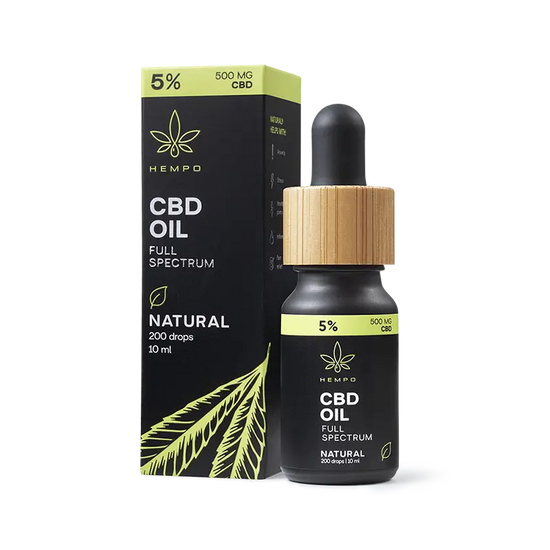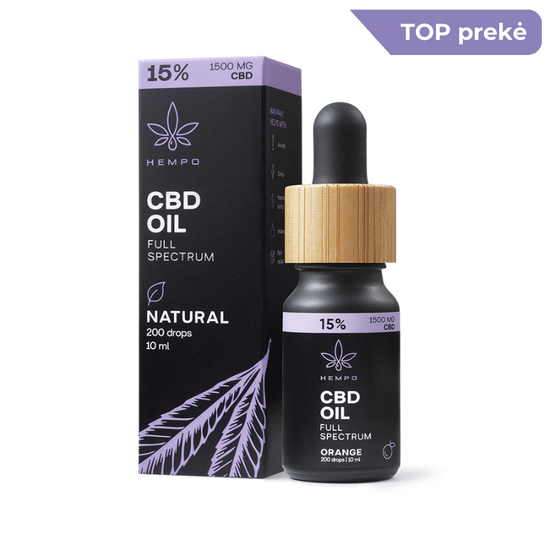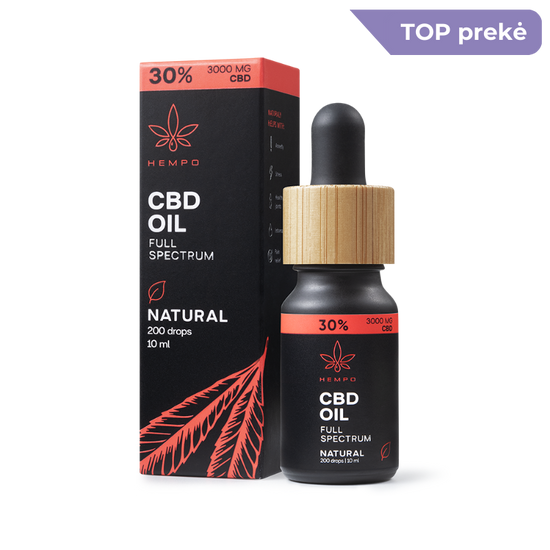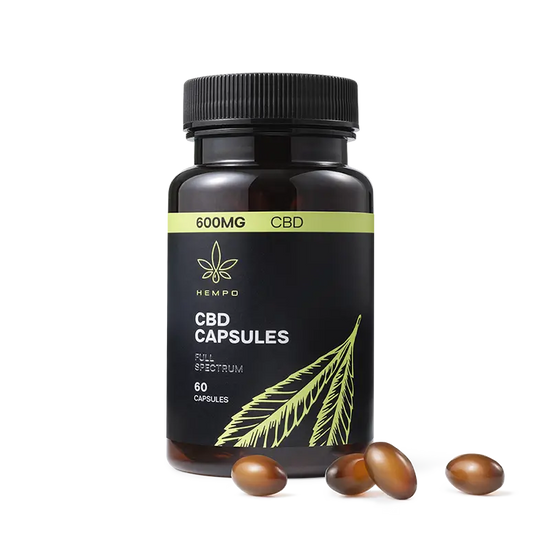With the increasing popularity of hemp products worldwide, one of the most frequently asked questions is ‘is CBD legal in Lithuania?’. Today, you can see hemp products almost everywhere – they are offered by many physical and online shops. Just take your pick!
And yet, CBD, or cannabidiol, was illegal in Lithuania for a long time. What about now? We will answer all your questions!
Note: This and other articles on Hempo's blog are for informational purposes only. According to the directive of the European Commission, cannabidiol is classified as a 'novel food', therefore CBD products should not be used as a food supplement in Lithuania.
The article discusses the history of CBD in Lithuania and Europe, how CBD differs from THC, and the benefits of CBD for the human body.
Straipsnio turinys
CBD in Lithuania and Europe: a brief history
CBD has taken Europe and the world by surprise over the past few years. The increasing availability of hemp products has shown great prospects for global economic growth. However, the somewhat more complicated and late availability of CBD in European markets, including Lithuania, was mainly determined by the number of countries that make up the Old Continent. It is basically impossible to have a standard set of laws and regulations in 44 countries (of which only 28 are members of the European Union).
Without common legislation, EU Member States can create an individual legal framework, taking into account the principle of free movement of goods.
After extremely long discussions, Lithuania took the step to legalise CBD at the end of 2021. What changed?
In 2021, the Government made a decision to allow the production of products from various parts of hemp (not only from seeds, as was the case before, but also from leaves, fibre and flowers). This step turned the green light for CBD oil and other valuable CBD products in Lithuania.
The short answer to the question "Is CBD legal in Lithuania?" is YES.
With the growing popularity of CBD, online commerce has made it easier for retailers to enter a market that would otherwise have been difficult to do. Today, cannabidiol products are widely available to healthy people suffering from various problems throughout Lithuania.

Legality of CBD products in the European Union
2021 In February, the European Union made an important legislative change regarding cannabidiol (CBD). It has been officially recognized as an INCI ingredient specifically for use in skin care products. This was a pivotal moment that essentially legalized the use of non-synthetic CBD in consumer cosmetics across the European market.
2022, further regulation of CBD has faced some difficulties. Although CBD has been recognized as a potential "novel food", the European Food Safety Authority (EFSA) has suspended 19 applications to add cannabidiol to the food list. However, this was not a negative indicator of CBD's safety; on the contrary, it showed EFSA's willingness to evaluate everything very carefully, which is very welcome. It has put the process on hold to gather more data on potentially negative long-term effects, meaning it is working diligently to complete the approval process in a way that benefits all stakeholders, including consumers.
2023, a new set of Common Agricultural Policy (CAP) rules came into force that further clarified the EU's approach to hemp and CBD. The CAP is the basis of EU agricultural standards and has been updated to reflect the growing importance of hemp in the European Union. One of the most important updates is the change in the permitted THC content of imported fiber hemp, which has now been increased from 0.2% to 0.3%.
This revision returns the THC limit for hemp imports to the pre-1999 level. previous level, signaling a softer attitude towards hemp and its imports.
In addition, the new CAP sets out the conditions for granting agricultural grants for the cultivation of hemp. EU farmers can now claim these payments if the THC content of the hemp they grow does not exceed 0.3%. This provision aims to balance the economic incentives for growing hemp and protect against potential abuse for drug production. Importantly, some member states, such as Italy and the Czech Republic, may allow higher levels of THC, while others may apply stricter limits, thus highlighting the flexibility of EU policy.
Together, these updates show that CBD and hemp regulation in the European Union is becoming more focused on harnessing the benefits of this plant.
Growing fiber hemp in Lithuania
The Parliament of Lithuania approved the amendments to the Law on Fiber Hemp, which paves the way for wider cultivation of hemp in the country. From 2023 January 1 the cultivation of hemp with a THC content of no more than 0.3% has become permitted, and hemp can be grown as a catch crop. Until then, only hemp varieties with up to 0.2% THC were allowed to be grown. This amendment also gave the right to research and study centers to grow hemp fiber in controlled environments, not only for breeding purposes, but also for various scientific experiments. The amendment to the law provides for fines for violating the requirements for the production and supply to the market of hemp products exceeding the 0.2% THC limit. According to the State Plant Breeding Service under the Ministry of Agriculture, there are 82 hemp varieties registered in the EU, while only two hemp varieties were included in the Lithuanian national list of plant varieties until then: "Austa SK" (included in 2018) and Alive SK (included in 2021) These varieties do not accumulate more than 0.2% THC in Lithuanian climate conditions. 78 MPs voted for the changes, 16 against, and 13 abstained.
Where to buy legal CBD products in Lithuania
Wondering where you can buy legal and safe CBD products in Lithuania? Online stores are usually the best choice, because there you can find user reviews and laboratory test results that help you understand the quality and benefits of each product. If you prefer shopping in person, physical stores are a great option; they usually carry a variety of CBD brands under one roof. Drugstores are another reliable source, but the prices of the products in such places are usually higher than in other places and the brands are unknown. CBD products can also often be found in specialty health food and wellness stores such as LIVIN. Each location has unique advantages, so choose according to your needs.
State supervision of CBD products in Lithuania
In Lithuania, the regulation and supervision of CBD products is carried out by several state institutions, including the State Food and Veterinary Service (VMVT), the State Consumer Rights Service (VVTAT) and the National Public Health Center (NVSC). These organizations regularly conduct tests on CBD products to verify their composition, claims, and proper notification, among other factors. Therefore, it is recommended to choose CBD products sold by Lithuanian companies, since these companies are subject to strict rules and high security requirements, in contrast to foreign companies, which can easily bypass the supervision procedures for CBD products carried out by Lithuanian authorities.
The future of CBD in Lithuania
We believe that the trajectory of CBD in Lithuania is on the verge of major changes, which are greatly influenced by the trends of the countries of the European Union, which tend towards the complete legalization of cannabidiol. In countries such as the USA and Germany, where CBD is fully legalized, there is a lot of evidence for the benefits of CBD for human health, as well as the safety of the substance. These data contribute to changes in perception and regulation across the EU. We are convinced that in the near future CBD will be widely used as a health product in Lithuania, but will also be used in treatment, food supplements and other sectors. The impetus is obvious, and the future possibilities of CBD in Lithuania are wide.
What is the difference between CBD and THC?
As for whether CBD is legal in Lithuania, it is very important to note that the European Union law allows the cultivation and marketing of hemp if the content of THC (tetrahydrocannabinol) is extremely low (e.g. 0.2%). From the end of 2021, this provision is also valid in Lithuania.
Such stringent THC concentration requirements are due to the fact that tetrahydrocannabinol, one of the many cannabinoids found in the hemp plant, is the only psychoactive component in hemp. THC can have strong hallucinogenic effects, making it undesirable for many people.
CBD, or cannabidiol, is also extracted from the hemp plant, but cannabidiol oil, capsules and other products do not have any unwanted hallucinogenic effects. In contrast, CBD has completely different, but no less surprising, properties.
Benefits of CBD for the human body
To fully understand the benefits of CBD to your body, it is important to consider your endocannabinoid system - a complex system of enzymes, neurotransmitters and receptors that play an important role in the development of your central nervous system. This system helps regulate multiple functions, including pain, motor control, memory, appetite, inflammation, etc.
With active research analysing the effects of CBD in these specific areas, more and more benefits of cannabidiol for health, well-being and aesthetics are coming to light. Let’s discuss at least a few of them.
CBD helps with neurological disorders
The experience has shown that CBD may benefit patients resistant to anti-epileptic medicines. In epilepsy, there is a certain neurological threshold in the brain, which, when triggered by certain environmental stimuli, causes the patient to have a seizure. CBD can help delay this neurological threshold and prevent most seizures, even when the usual medications used to control epilepsy are not effective.
Other studies show that CBD is effective in alleviating and successfully controlling the symptoms of multiple sclerosis, Parkinson's disease and Alzheimer's disease. This is thanks to the unique neuroprotective, anti-inflammatory properties of cannabidiol. However, more research is needed. For now, numerous experts assume that many of these symptoms may be alleviated not by pure CBD (such as CBD tincture), but by a combination of CBD and other cannabinoids (e.g., full-spectrum CBD oil).
CBD alleviates pain
Once in the body, cannabidiol interacts with neurotransmitters (such as serotonin) in the central nervous system. In this way, CBD can effectively reduce chronic pain related to different factors, such as inflammation, arthritis or nerve damage.
In a 2021 study conducted in California, US, 69% of the participants reported that regular use of CBD oil and other cannabidiol products had significantly reduced pain, and most participants were able to significantly reduce their pain medications thanks to cannabidiol.

CBD helps with anxiety disorders
For people diagnosed with an anxiety disorder, the mere thought of connecting with others in a social setting can be so unbearable that they rather choose isolation and avoiding any contact. Medications and medicinal products for anxiety disorders often help to relieve anxiety, but have negative side effects: indigestion, drowsiness, nausea and other unpleasant health problems.
In this case, CBD oil is a good alternative. It has been shown to help relax and reduce anxiety, which helps people who feel tense in social situations when interacting with a larger group of people, giving a public speech, etc.
CBD improves your skin and hair
Cannabidiol products calm skin inflammations, relieve acne symptoms, and moisturise and nourish your skin, making them very beneficial for patients with atopic dermatitis (psoriasis), who complain of worn, dry face and body skin.
Not only that, CBD oil can reduce hair loss, strengthen hair follicles and promote hair growth. Another benefit is that cannabidiol can normalise sebum production by scalp, reducing such problems as dandruff and dry scalp.
Cannabidiol can be an effective product in dealing with emotional problems, achieving better physical well-being and nurturing your skin and hair. For the best result, the key is to pay attention to the product’s composition and the seller’s reputation. Always choose certified and tested CBD products that are legal in Lithuania. Also, if you have a chronic medical condition, it’s always a good idea to check with your doctor before trying CBD for the first time. Your doctor will advise you on safe cannabidiol levels, usage and potential contraindications.
We hope that we managed to dispel the myths related to CBD and answered the question of whether CBD legal is in Lithuania.





